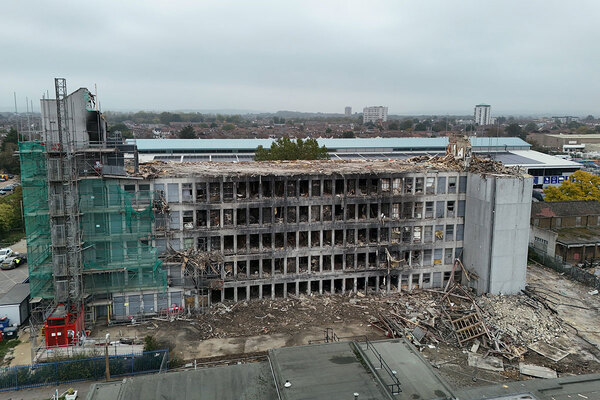You are viewing 1 of your 1 free articles
Building more homes won’t solve the housing crisis if they are all in London
Government policy needs to disperse housing demand around the country, argues Alan Fraser.
In his recent Autumn Budget the chancellor Philip Hammond committed £44bn to ensure that 300,000 new homes are built every year.
We should all welcome this commitment.
The government’s own figures show that homelessness and rough sleeping have increased year-on-year since 2010 having decreased year-on-year for the seven years prior to that.
Something clearly had to be done and the government has now committed to ensuring that it is.
But it is important to realise that building 300,000 new homes every year will not, of itself, solve the housing crisis.
The shortage of affordable housing is not a uniform national phenomenon. In places such as Liverpool and Stoke-on-Trent councils are selling off homes for as little as £1 in an attempt to refill whole streets and neighbourhoods that have been emptied.
Why? Because the population is slowly being concentrated inside the M25 ring. In the past two decades the number of jobs in London has increased by a massive 40%, according to Greater London Authority research.
Consequently the number of people living in London has increased by 25%. While some of those people are coming from abroad, many are coming from the UK regions in pursuit of the best job and career opportunities. Unfortunately the number of homes in London has increased by only 15% principally because of a shortage of developable sites in the capital.
The provinces meanwhile are gradually being emptied. The population of Liverpool nearly halved between 1914 and 2014, according to a recent Dispatches programme on Channel 4 - and there were dramatic declines in other regional cities such as Glasgow too.
The point here is that land inside the M25 is a finite resource.
There is a lot more of it available in other parts of the country – parts where they are desperate to welcome new people and reverse decades of population flight. But you cannot build homes there if there are no jobs there.
So allied to the chancellor’s housebuilding drive, we also need to see a real and meaningful commitment to regionalisation.
We need to see the government actively encourage investment in and job transference to the regions.
This certainly means equalising infrastructure investment levels.
At the moment more than half of all transport infrastructure investment is spent in London – for every pound spent in the North East, £30 is spent in London.
That investment disparity is simply overheating the economy is one part of the country while impairing it everywhere else.
It is also clear that we need an industrial strategy that encourages the creation of regional hubs for certain industries in certain areas.
Cambridge for instance is already a tech hub, and Manchester is starting to become a media hub. Government needs to be far more intentional about this by incentivising industries to co-locate to specific areas.
That could involve regionalising corporation tax and business rates so that moving or setting up your business outside of London becomes financially attractive – and staying inside London becomes prohibitively expensive for industries other than those which we wish to remain (such as financial services).
It will also involve government proactively moving specific public services outside of the capital. Birmingham, for instance, has the largest number of legal chambers outside of London; why not build on that by moving the High Court and Court of Appeal to our second city too?
"Many people resent having to move to London to progress in their career"
By concentrating whole industries in areas such as these, people come to understand that they can build a career without having to move to the capital.
There is land available for development in the regions and people who want to live there.
Many people resent having to move to London to progress in their career – we need to make sure they don’t have to.
Simply building more homes will not solve the housing crisis if they are all built in and around London.
That will simply exacerbate the long-term problem and lead to further overheating of the London housing market, while outside of the M25 the English regions slowly die.
People will either have to travel further to travel to their place or work – or we will see additional huge increases in homelessness and insecure housing in London as the number of people who need to move to the city for work exceeds the number of homes that can physically fitted into the available space.
The chancellor’s announcement therefore, is a good start, but it needs to be backed up by strategies that disperse, rather than concentrate, housing demand.
Alan Fraser is chief executive of YMCA Birmingham.
KEY BUDGET MEASURES AT-A-GLANCE
- Investment of £44bn in housebuilding in capital funding, loans and guarantees over the next five years to boost supply of skills, resources and land
- Commitment to be building 300,000 homes a year by mid-2020s
- £1.5bn package of changes to Universal Credit announced. This includes the scrapping of the seven-day waiting period at the beginning of a claim, making a full month’s advance available within five days of a claim for those that need it and allowing claimants on housing benefit to continue claiming for two weeks
- Lift council borrowing caps in "high-demand areas"
- A £125m increase over two years in Targeted Affordability Funding for Local Housing Allowance claimants in the private sector struggling to pay their rent
- New money into Home Builders Fund
- Extra £2.7bn for Housing Infrastructure Fund
- Invest £400m in estate regeneration
- £1.1bn on unlocking strategic sites
- Stamp duty for first time buyers on properties worth up to £300k will be axed, while the first £300k on properties worth up to £500k will also be scrapped
- Three new Housing First pilots announced for West Midlands, Manchester and Liverpool
- Councils to be given the power to charge 100% council tax premium on empty properties
- Government will launch a consultation to barriers to longer tenancies in the private rented sector
- £38m for Kensington & Chelsea Council for mental health and counselling services, regeneration projects in areas surrounding Grenfell Tower and a new community space
- Invest in five new garden towns
- £125m increase in Targeted Affordability Funding for Local Housing Allowance claimants in the private sector struggling to pay rent












